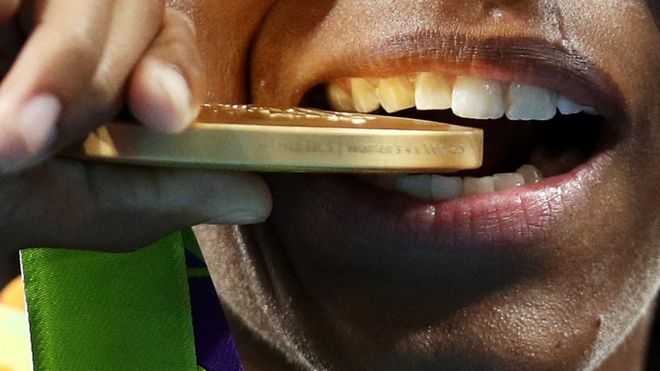ReCycling? First the Good News....
"We're obliterating our natural ecosystems predominantly to produce monocrops that go into the industrial food web, and what's bad on land is even worse underwater [e.g.rainforest destruction coral reef bleaching]."
Keiran Whitaker, Entocycle start-up, London
| The larval form of the black soldier fly is over 50 per cent protein by weight. (Frances Willick/CBC) |
"The Olympics story [producing Olympic and Paralympic medals from e-waste-retrieved metals] is really good [because it brings attention to the issue] of creative re-cycling."
"It shows that the way we do things at the moment has terrible consequences for society, in terms of the negative health impacts and obviously impacts to climate change."
Vanessa Gray, official, United Nations environmental agency
 |
| Japan is exploring the feasibility of forging the Olympic 2020 medals using precious metals salvaged from electronic waste. Getty Images |
In London, England, the brainchild, Entocycle, of Kevin Whitaker uses local food waste that has been created in manufacturing food products to feed to black soldier fly larvae. The larvae consume the waste and it is converted into protein. That's the point when the insects are ground into a flour high in amino acids, combined with other ingredients to produce feed pellets for animals.
That's not all; the excrement created by the flies -- called frass -- can then be used as well, as agricultural fertilizer. Long-range expectations are that once the public adjusts to this new way of producing food, the insect flour could be used and eaten by people. The result would be enormous; fewer forests razed to produce cropland or pasture, and the fertilizer production held to be responsible for one percent to two percent of global greenhouse gas emissions avoided in the process.
The global issue of waste is the need to ensure that less of it is created, and that which is created can be used in purposeful ways, avoiding excess environmental and atmospheric pollution. There is, in fact, a wave of imaginatively creative thinking consuming the minds of entrepreneurs guiding them to correct current inefficiencies in producing and handling waste products, to turn them into useful substances in an effort toward reduction.
In Finland a company has been absorbed in a production method to dramatically change the way fabrics are extracted from wood to produce clothing. Cotton and viscose rayon, representing the second and third most common textile fibres, are produced from plants. Wood pulp is used to produce most viscose rayon with the use of an assortment of chemicals, that themselves are a source of criticism.
The Rainforest Action Network finds about 120 million trees are used for the production of textiles annually, an obvious practise harmful to the world's forests whose presence cleans our atmosphere absorbing carbon dioxide, while producing clean oxygen kind to the lungs of humanity. A Finnish textile fibre company called Spinnova founded by two former physicists is transforming the process.

One of the company's founders thought of patterning the spinning of plant fiber in the very way that spiders produce silk. And now Spinnova uses a mechanical method to produce fibre, a process that makes use of about 99 percent less water than the production of cotton, without the use of harmful chemicals. Wood pulp harvested from Brazilian wood is used by Spinnova and it plans to make use of agricultural waste material as well as discarded clothing in its fibre production.
Japan, a tiny set of three islands in the Pacific, has a population of 130 million people. Famously, Japan produces technologically advanced communications tools and its turnover rate as new models reach the consumer market is enormous, leaving it with an electronic waste (e-waste) conundrum. There was a time when Japan simply buried used or unsold stale-model computers. Japan also likes to move its production along; Japanese love their cars, and update their models and acquisitions by the driving public constantly.
Older vehicles that fail to pass stringent technical and safety and pollution standards are shipped abroad, newer models taking their place constantly in auto showrooms and consumers' possession. Disposal of immense numbers of cellphones, computers and televisions complicated by the risks of leaking dangerous chemicals into the environment was a problem seeking a solution, leading to an advanced recycling system.
In over 1,500 municipalities in Japan with their thousands of electronics stores, 42,000 tons of discarded electronics were collected, as well as over five million cellphones. And a process to recover metals was initiated from the trove, representing metals which would be re-used, bypassing a need for additional mining.
Yet out of this innovative solution, another kind of problem has arisen, identified by a paper in the Lancet, pointing out the potential harm to human health. The industry of recycling, employing people to break asunder electronic devices to remove copper, gold, mercury and other materials has the misfortune of producing negative health consequences on those very workers employed to help solve the problem of waste and encourage recycling.
 |
| All medals for the Tokyo 2020 Olympics will be made from metal collected by recycling electronic waste |
Labels: Britain, e-Waste, Finland, Food Products, Japan, Recycling

0 Comments:
Post a Comment
<< Home